英语问路方式
如何用英语问路

如何用英语问路1. 用英语问路的常用套语:Excuse me, can you tell me where the railway station is?对不起,请问火车站在哪儿?Excuse me, but can you tell me the way to the train station?劳驾,请问去火车站怎么走? Excuse me, could you tell me which is the way to the nearest hospital?请问去最近的医院怎么走?Excuse me, would you please show me the way to the post office?请告诉我去邮局怎么走好吗?Excuse me, would you mind telling me the way to the police station?对不起,请告诉我去警察局怎么走好吗?Excuse me, could you give me some directions?请你给我指指路好吗?Excuse me, can you direct me to the post office?请问到邮局怎么走?Excuse me, where‘s the men’s (ladies‘), please?请问男(女)厕所在什么地方?Excuse me, where‘s the bus station, please?请问公共汽车站在什么地方?Excuse me, how can I get to the No. 1 Middle School?请问去一中怎么走?Excuse me, could you tell me where there is a public telephone?请问哪儿有公用电话?Excuse me, is this the right way to the People‘s Park?请问去人民公园走这条路对吗?Excuse me, does this bus go to the train station?请问这公共汽车是开火车站的吗?Excuse me, I wonder if you could do me a favour. I‘m looking for the police station?对不起,不知能否帮我,我在找警察局。
在英语中如何表达问路
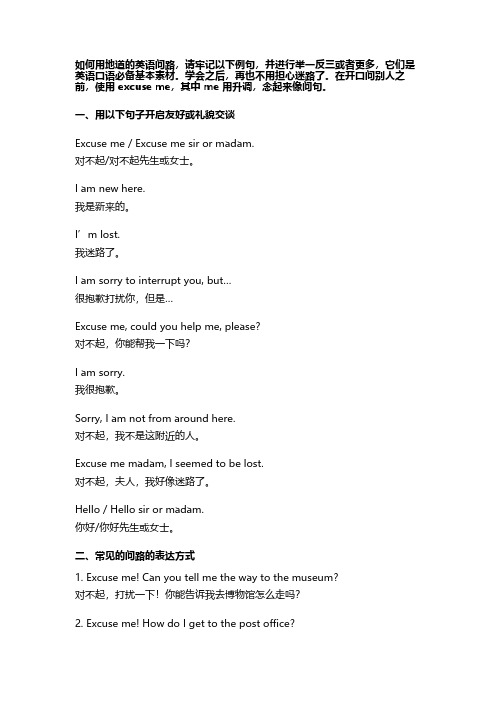
如何用地道的英语问路,请牢记以下例句,并进行举一反三或者更多,它们是英语口语必备基本素材。
学会之后,再也不用担心迷路了。
在开口问别人之前,使用 excuse me,其中 me 用升调,念起来像问句。
一、用以下句子开启友好或礼貌交谈Excuse me / Excuse me sir or madam.对不起/对不起先生或女士。
I am new here.我是新来的。
I’m lost.我迷路了。
I am sorry to interrupt you, but…很抱歉打扰你,但是…Excuse me, could you help me, please?对不起,你能帮我一下吗?I am sorry.我很抱歉。
Sorry, I am not from around here.对不起,我不是这附近的人。
Excuse me madam, I seemed to be lost.对不起,夫人,我好像迷路了。
Hello / Hello sir or madam.你好/你好先生或女士。
二、常见的问路的表达方式1. Excuse me! Can you tell me the way to the museum?对不起,打扰一下!你能告诉我去博物馆怎么走吗?2. Excuse me! How do I get to the post office?对不起,打扰一下!我怎么去邮局?3. Pardon me! I’m lost. How do I get to the cafe?对不起!我迷路了。
我怎么去咖啡馆?4. Please tell me how I get to your apartment?请问怎么去你的公寓?5. Excuse me! Is there a hospital near here?对不起,打扰一下!这附近有医院吗?6. What’s the best way to supermarket?去超市最好的方法是什么?7. Excuse me! Could you tell me how to get to bookstore? 对不起,打扰一下!你能告诉我怎么去书店吗?8. Excuse me! Do you know where the church?对不起,打扰一下!你知道教堂在哪里吗?9. Could you help me, please? I’m looking for the bank. 你能帮帮我吗?我在找银行。
用英文问路的十种表达方式
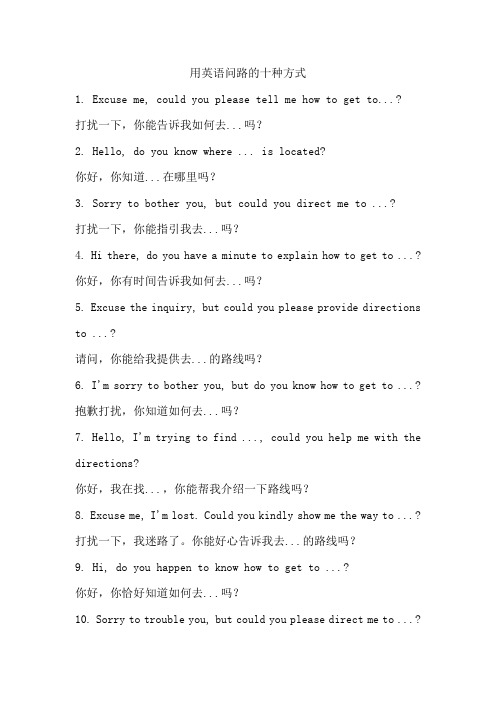
用英语问路的十种方式1. Excuse me, could you please tell me how to get to...?打扰一下,你能告诉我如何去...吗?2. Hello, do you know where ... is located?你好,你知道...在哪里吗?3. Sorry to bother you, but could you direct me to ...?打扰一下,你能指引我去...吗?4. Hi there, do you have a minute to explain how to get to ...? 你好,你有时间告诉我如何去...吗?5. Excuse the inquiry, but could you please provide directions to ...?请问,你能给我提供去...的路线吗?6. I'm sorry to bother you, but do you know how to get to ...? 抱歉打扰,你知道如何去...吗?7. Hello, I'm trying to find ..., could you help me with the directions?你好,我在找...,你能帮我介绍一下路线吗?8. Excuse me, I'm lost. Could you kindly show me the way to ...? 打扰一下,我迷路了。
你能好心告诉我去...的路线吗?9. Hi, do you happen to know how to get to ...?你好,你恰好知道如何去...吗?10. Sorry to trouble you, but could you please direct me to ...?抱歉打扰,你能指引我去...吗?以上都是常用的问路表达方式,用礼貌的语气向当地人询问路线。
英语问路及答语
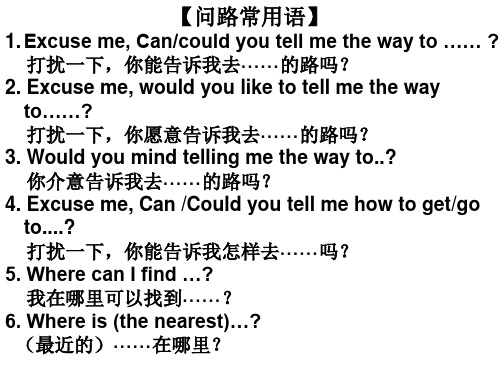
A: 打扰一下。附近有图书馆么? B: 是的。在这个药店和邮局之间有一座图书馆。 A: 非常感谢你。 B: 不客气。
【指路常用语】
(1)Go along/down/up this street/road. 顺着这条路往前走。 (2)Follow this road and turn left/right at the first/second…crossing. 顺着这条路走,然后在第一/二…个十字路 口往左/右拐。 (3)Turn right at the next corner. 在下一个拐角处向右拐。 (4)Go on until you reach the end. 继续走到路的尽头。
(13) It’s about …meters from here. / It’s about… minutes’ walk from here. 那离这里有· · · 米远 /从这里走到那里大概 要· · · 分钟 (14)You’d better take a taxi. 你最好乘坐出租车去 (15) It’s over there. 在那边 (16) You can't miss it. 意思是“It's very easy to find !” 你很容易找到它! (17)Sorry, I don’t know. I’m a stranger here, too. 对不起,我不知道,我也是个外地人
(5)Take the second turning on the right/left. 第二个路口右/左转。 (6)You'll see the …on the right/left. 在右/左边,你就能看到…
(7) It’s (in / on / to the) south / north / west / east of …….. 它在· · · · · · 的南部/北部/西部/东部
英语问路的表达

十句实用英语问路表达1.Take the one-way street. 走这条单行道。
One-way street 就是单行道。
尤其在Downtown地区,以亚特兰大和纽奥良为例,其复杂的程度可以用进的去,出不来来形容,实在不是个愉快的开车经验。
2.You will stay on the street for a while until you hit the first traffic light.你会走一会儿,直到你遇到第一个红绿灯。
有一次我开车老美坐我旁边,他帮我指路就是这么说的。
Stay for a while 通常指五到十分钟的时间,不会太久。
遇见某样东西,可以用hit 这个字,如hit the traffic light, hit the stop sign 等等。
而traffic light 也有人说成light,或stoplight。
3.Then take a left. 向左转。
向左转可以说成turn left,take a left 或是Make a left。
有时光讲take a left 不明确,你可以加上路名,明确地告诉人家要转哪一条路,例如Take a left into Hemphill Ave。
或是Take a left onto Hemphill Ave。
4.It will be Hemphill Ave. It’s two-lane traffic. 那就会是Hemphill Ave,它是一条双线道。
指路的时候如果能够说出街道名称是最好,所以通常我会把转到哪一条路的路名也指出来。
至于是几线道一般指路的时候则比较不会提及。
双线道是指来去各一个车道共二线道而言,四线道就是four-lane traffic。
像亚特兰大的Interstate Highway 有些地方都是十二线道,那就是twelve-lane traffice 够惊人吧。
e down Hemphill Ave about five blocks. 由Hemphill 街往下走约五个blocks。
如何用英语问路
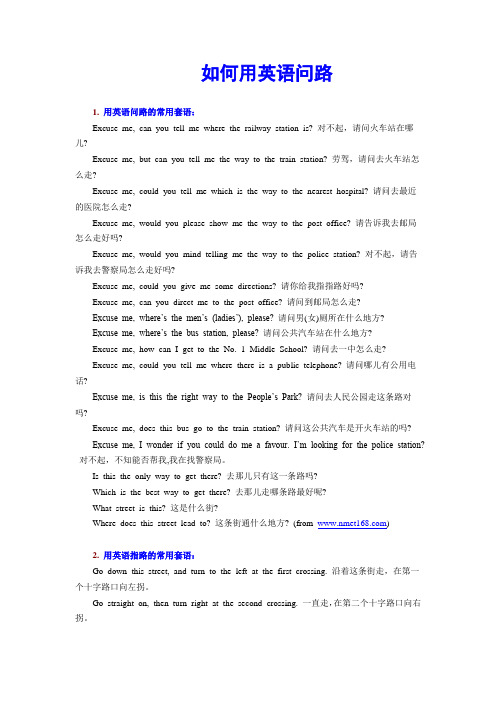
如何用英语问路1.用英语问路的常用套语:Excuse me, can you tell me where the railway station is? 对不起,请问火车站在哪儿?Excuse me, but can you tell me the way to the train station? 劳驾,请问去火车站怎么走?Excuse me, could you tell me which is the way to the nearest hospital? 请问去最近的医院怎么走?Excuse me, would you please show me the way to the post office? 请告诉我去邮局怎么走好吗?Excuse me, would you mind telling me the way to the police station? 对不起,请告诉我去警察局怎么走好吗?Excuse me, could you give me some directions? 请你给我指指路好吗?Excuse me, can you direct me to the post office? 请问到邮局怎么走?Excuse me, where’s the men’s (ladies’), please? 请问男(女)厕所在什么地方?Excuse me, where’s the bus station, please? 请问公共汽车站在什么地方?Excuse me, how can I get to the No. 1 Middle School? 请问去一中怎么走?Excuse me, could you tell me where there is a public telephone? 请问哪儿有公用电话?Excuse me, is this the right way to the People’s Park? 请问去人民公园走这条路对吗?Excuse me, does this bus go to the train station? 请问这公共汽车是开火车站的吗?Excuse me, I wonder if you could do me a favour. I’m looking for the police station?对不起,不知能否帮我,我在找警察局。
学习简单的问路和购物用语

学习简单的问路和购物用语在旅行或者生活中,问路和购物都是我们经常需要用到的基本技能。
掌握简单的问路和购物用语能够帮助我们更好地适应和融入新环境,方便自己的生活。
下面将介绍一些常用的问路和购物用语,以帮助大家提高交际能力。
1. 问路用语当我们在一个陌生的城市或者地方时,询问路线是我们常常遇到的情况。
以下是一些常用的问路用语:(1) Excuse me, can you tell me how to get to [地点]?对不起,你能告诉我去[地点]怎么走吗?(2) Could you please show me the way to [地点]?请问你能给我指一下去[地点]的路吗?(3) Where can I find [地点]?我在哪里可以找到[地点]?(4) Is it far from here?离这里远吗?(5) How long does it take to get there?去那儿要多长时间?在问路时,可以用以上表达来获得对方的指引和建议。
如果对方不熟悉路线,也可以请他们帮你问其他人或者给你指出一个能够帮助的指引点。
2. 购物用语购物是我们生活中常常需要进行的一项活动,以下是一些常用的购物用语:(1) How much does it cost?这个多少钱?(2) Can I have a discount?可以打折吗?(3) Do you have a smaller/bigger size?有没有更小/更大号的?(4) Can I try it on?我可以试穿一下吗?(5) Can I pay by credit card?可以用信用卡支付吗?以上是一些常用的购物时需要用到的句子,可以根据具体的购物场景进行应用。
在购物时,可以礼貌地询问价格、尺码、支付方式等,以满足自己的需求。
除了问路和购物用语,还有其他一些基本的交际用语可以帮助我们更好地融入当地的生活。
例如:(1) Hello/Hi/Good morning/Good afternoon/Good evening.你好/早上好/下午好/晚上好。
如何用英语问路(基本句型)
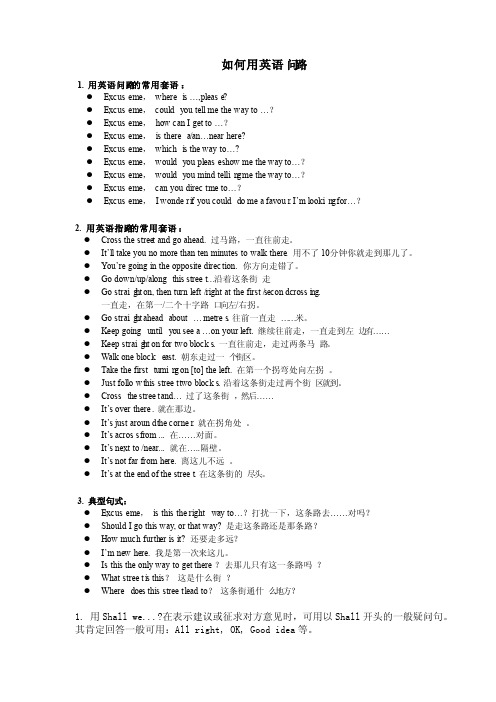
如何用英语问路1. 用英语问路的常用套语:●Excuse me,wherei s …,please?●Excuse me,couldyou tell me the way to …?●Excuse me,how can I get to …?●Excuse me,is therea/an…near here?●Excuse me,whichi s the way to…?●Excuse me,wouldyou please show me the way to…?●Excuse me,wouldyou mind tellin g me the way to…?●Excuse me,can you direct me to…?●Excuse me,I wonder i f you coulddo me a favour. I’m lookin g for…?2. 用英语指路的常用套语:●Crossthe street and go ahead.过马路,一直往前走。
●It’lltakeyounomor e than ten minute s to walk there.用不了10分钟你就走到那儿了。
●You’regoingin the opposi te direct ion. 你方向走错了。
●Go down/up/alongthis street…沿着这条街走●Go straig ht on, then turn left /rightat the first/second crossi ng.一直走,在第一/二个十字路口向左/右拐。
●Go straig ht aheadabout… metres. 往前一直走……米。
●Keep goinguntil you see a …on your left. 继续往前走,一直走到左边有……●Keep straig ht on for two blocks. 一直往前走,走过两条马路。
如何用英语问路
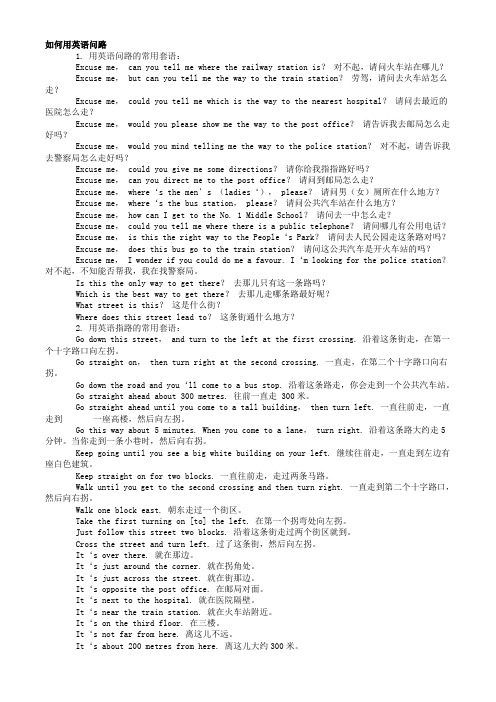
如何用英语问路1. 用英语问路的常用套语:Excuse me, can you tell me where the railway station is?对不起,请问火车站在哪儿?Excuse me, but can you tell me the way to the train station?劳驾,请问去火车站怎么走? Excuse me, could you tell me which is the way to the nearest hospital?请问去最近的医院怎么走?Excuse me, would you please show me the way to the post office?请告诉我去邮局怎么走好吗?Excuse me, would you mind telling me the way to the police station?对不起,请告诉我去警察局怎么走好吗?Excuse me, could you give me some directions?请你给我指指路好吗?Excuse me, can you direct me to the post office?请问到邮局怎么走?Excuse me, where‘s the men’s (ladies‘), please?请问男(女)厕所在什么地方?Excuse me, where‘s the bus station, please?请问公共汽车站在什么地方?Excuse me, how can I get to the No. 1 Middle School?请问去一中怎么走?Excuse me, could you tell me where there is a public telephone?请问哪儿有公用电话?Excuse me, is this the right way to the People‘s Park?请问去人民公园走这条路对吗?Excuse me, does this bus go to the train station?请问这公共汽车是开火车站的吗?Excuse me, I wonder if you could do me a favour. I‘m looking for the police station?对不起,不知能否帮我,我在找警察局。
教你用英语问路

问路1.Go straight沿着2.Turn right / left 向右/ 左3.It looks/sounds/feels/tastes/smells great/awful.关于问路1.问路大多从“对不起”(Excuse me)开始。
然后开始说:I…d like to go to........2.句型:Could you tell me how to get to _____? 是问去具体某个地方,像博物馆,酒店,或街道的标准句型。
3.如果你不是问一个具体的地方,但需要找到附近的银行,地铁站,厕所,等等的地方,那么最好的方式就是用这样的短语"Where is the closest_____?"4.人们解释事物所在地最常用的一种方式就是使用术语…blocks…。
block 是在两个十字路口之间的一段街区。
因此…the next block…意味着下个路口之后的那段街区,而three blocks ahead意味着在同一条街道上但过接下来的三个路口。
四、为别人指路:1.Go along the street until you come to the traffic lights. 沿这条路一直走到红绿灯那儿。
2.Turn right / left at the second crossing. (Take the second turning on the right / left.) 在第二个十字路口向右/ 左转弯。
3.Take a number 46 bus, and get off at the square. 坐46路公共汽车,在广场下车。
4.It…s on the corner of Huaihai Street and Xizang Road. 在淮海路和西藏路的路口。
5.Go straight ahead along the bund and then turn left. 沿着外滩往前走,然后往走转弯。
英语问路和指路的句型
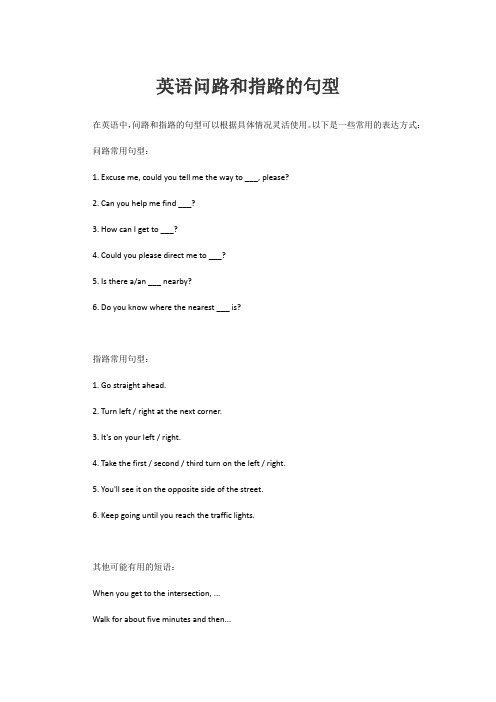
英语问路和指路的句型在英语中,问路和指路的句型可以根据具体情况灵活使用。
以下是一些常用的表达方式:问路常用句型:1. Excuse me, could you tell me the way to ___, please?2. Can you help me find ___?3. How can I get to ___?4. Could you please direct me to ___?5. Is there a/an ___ nearby?6. Do you know where the nearest ___ is?指路常用句型:1. Go straight ahead.2. Turn left / right at the next corner.3. It's on your left / right.4. Take the first / second / third turn on the left / right.5. You'll see it on the opposite side of the street.6. Keep going until you reach the traffic lights.其他可能有用的短语:When you get to the intersection, ...Walk for about five minutes and then...Cross the bridge and you'll be there.You'll have to take a taxi / bus / subway to get there.You won't miss it; it's a big building / has a sign outside.If you get lost, just ask someone else.请根据实际需要调整这些句型中的地点名称或方向词(如left、right)。
如何用英语问路
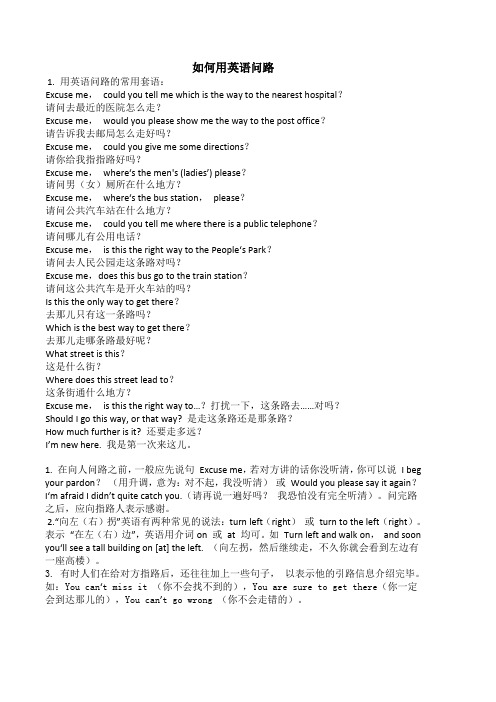
如何用英语问路1. 用英语问路的常用套语:Excuse me,could you tell me which is the way to the nearest hospital?请问去最近的医院怎么走?Excuse me,would you please show me the way to the post office?请告诉我去邮局怎么走好吗?Excuse me,could you give me some directions?请你给我指指路好吗?Excuse me,where‘s the men's (ladies’) please?请问男(女)厕所在什么地方?Excuse me,where‘s the bus station,please?请问公共汽车站在什么地方?Excuse me,could you tell me where there is a public telephone?请问哪儿有公用电话?Excuse me,is this the right way to the People‘s Park?请问去人民公园走这条路对吗?Excuse me,does this bus go to the train station?请问这公共汽车是开火车站的吗?Is this the only way to get there?去那儿只有这一条路吗?Which is the best way to get there?去那儿走哪条路最好呢?What street is this?这是什么街?Where does this street lead to?这条街通什么地方?Excuse me,is this the right way to…?打扰一下,这条路去……对吗?Should I go this way, or that way? 是走这条路还是那条路?How much further is it? 还要走多远?I’m new here. 我是第一次来这儿。
如何用英语问路

如何用英语问路1. 用英语问路的常用套语:Excuse me, can you tell me where the railway station is?对不起,请问火车站在哪儿?Excuse me, but can you tell me the way to the train station?劳驾,请问去火车站怎么走?Excuse me, could you tell me which is the way to the nearest hospital?请问去最近的医院怎么走?Excuse me, would you please show me the way to the post office?请告诉我去邮局怎么走好吗?Excuse me, would you mind telling me the way to the police station?对不起,请告诉我去警察局怎么走好吗?Excuse me, could you give me some directions?请你给我指指路好吗?Excuse me, can you direct me to the post office?请问到邮局怎么走?Excuse me, where‘s the men’s (ladies‘), please?请问男(女)厕所在什么地方?Excuse me, where‘s the bus station, please?请问公共汽车站在什么地方?Excuse me, how can I get to the No. 1 Middle School?请问去一中怎么走?Excuse me, could you tell me where there is a public telephone?请问哪儿有公用电话?Excuse me, is this the right way to the People‘s Park?请问去人民公园走这条路对吗?Excuse me, does this bus go to the train station?请问这公共汽车是开火车站的吗?Excuse me, I wonder if you could do me a favour. I‘m looking for the police station?对不起,不知能否帮我,我在找警察局。
英语问路情景对话

让知识带有温度。
英语问路情景对话英语问路情景对话英语问路情景对话1、问路的几种表示办法:a. Excuse me, but can you tell me the way to the museum? 请你告知我去博物馆怎么走?b. Could you tell me how I can get to the museum? 请你告知我去博物馆怎么走?c. Would you please tell me where the post office is? 请告知我邮局在哪儿?d. Excuse me, but please tell me how to get to the railway station? 请问,去火车站怎么走?e. Excuse me, but I'm trying to find a chemist's shop. 对不起,我要找一家药店。
f. Would you please tell me if there is a hospital nearby? 请问附近有医院吗?g. Is the zoo far from here? 动物园离这儿远吗?h. Will it take long to get to the airport? 去机场要很长时光吗?2、回答别人问路的表示办法:a. Go along the street until you come to the traffic lights. 沿这条路第1页/共2页千里之行,始于足下向来走到红绿灯那儿。
b. Turn right / left at the second crossing. (Take the second turningon the right / left.) 在其次个十字路口向右/ 左转弯。
c. Take a number 46 bus, and get off at the square. 坐46路公共汽车,在广场下车。
五种问路的英语句型

五种问路的英语句型Here are five common English sentence patterns for asking directions:1. Excuse me, could you please tell me how to get to [destination]?This is a polite and straightforward way to ask for directions. It's important to use the person's name ("Excuse me") to acknowledge their attention and to frame the question as a request for information ("could you please tell me"). Replace "[destination]" with the specific place you're trying to find, such as a street name, a building, or a landmark.2. I'm trying to find [destination]. Can you help me with directions?This sentence pattern is similar to the first one, but it focuses more on your goal of finding a particularlocation. It's also a good choice if you're not sure how to phrase your question or if the destination is somewhat complex to describe. Again, replace "[destination]" with the specific place you're looking for.3. I'm lost. Could you please direct me to [destination]?This sentence pattern is useful if you're feeling overwhelmed or confused about where you are. Acknowledging your confusion ("I'm lost") makes it easier for the person to understand your need for help. As with the previous examples, replace "[destination]" with the name of the place you're trying to reach.4. I'm looking for [destination]. Do you know where it is?This sentence pattern is informal and conversational, making it suitable for casual settings or when speaking with someone you're not familiar with. It's important to keep the tone friendly and respectful, even in informalcontexts. Replace "[destination]" with the name of theplace you're searching for.5. I'm heading to [destination], but I'm not sure howto get there. Can you assist me?This sentence pattern is polite and respectful, emphasizing your need for assistance ("Can you assist me?"). It's a good choice if you're in a formal or business setting, or if you want to make sure the person feels comfortable providing directions. Once again, replace "[destination]" with the specific location you're trying to reach.Remember to be polite and respectful when asking for directions, and to thank the person for their help. It's also a good idea to have a map or GPS available to confirm the directions they give you. With these five sentence patterns, you'll be able to confidently ask for directionsin English no matter where you are.。
英语问路方式

英语问路与指路的常用句型1.常用的问路句型:Excuse me,where is the....? 请问...在哪里?how do/can I get to the....?请问如何到....?/请问到....怎么走?Is there a ....near here / nearby?请问附近有...吗?could you tell me how I can get to...?你能告诉我到...怎么走吗? could you tell me which is the way to ...?请问去...该怎么走?2.常用的问距离和交通方式句型:How far is it from here? 离这儿有多远?is it far from here?离这里远吗?Can I take a bus? 我可以坐公共汽车吗?Which bus shall I take? 我应该坐那一路车?3.常用的表示方向/方位的短语:go straight ahead 一直走go through --(内部)穿过cross --(表面)横穿动词.{例如:桥、马路}=go/walk across turn left= take the +(序数词)turning on the left 左拐turn right…. =take the +(序数词)turning on the right 右拐next to --紧挨着=close to/ besidebetween...and -- 在···中间opposite … -- 在···正对面in front of --在外部的前面in the front of --在内部的前面in the middle of = in the center of --在中央behind... 在...后面4.常用的回答问路及位置的句子:1) Go along the ...and turn left/right at the...crossing.沿着...(街道)往前走,在第..个路口往左/右转.2) It's next to the.../behind the.../ between...and ... 它就在..旁边/在...后面/在..和...之间3) first,take a bus to ...,then walk along...,it's next to the ...on yourleft/right.首先,乘坐公共汽车去...(街道/站),然后沿着...步行往前走,它就在你左/右手边紧挨着.... 4) you can take a bus/subway/taxi there.你可以乘坐公共汽车/地铁/出租车去那里5) You can’t miss it 你不会错过它。
- 1、下载文档前请自行甄别文档内容的完整性,平台不提供额外的编辑、内容补充、找答案等附加服务。
- 2、"仅部分预览"的文档,不可在线预览部分如存在完整性等问题,可反馈申请退款(可完整预览的文档不适用该条件!)。
- 3、如文档侵犯您的权益,请联系客服反馈,我们会尽快为您处理(人工客服工作时间:9:00-18:30)。
英语问路方式
Modified by JACK on the afternoon of December 26, 2020
英语问路与指路的常用句型
1.常用的问路句型:
Excuse me,where is the.... 请问...在哪里
how do/can I get to the....请问如何到....
/请问到....怎么走
Is there a ....near here / nearby?请问附近有...吗
could you tell me how I can get to...你能告诉我到...怎么走吗 could you tell me which is the way to ...请问去...该怎么走
2.常用的问距离和交通方式句型:
How far is it from here 离这儿有多远?
is it far from here?离这里远吗
Can I take a bus 我可以坐公共汽车吗?
Which bus shall I take 我应该坐那一路车?
3.常用的表示方向/方位的短语:
go straight ahead 一直走
go through --(内部)穿过
cross --(表面)横穿动词.{例如:桥、马路}=go/walk across turn left= take the +(序数词)turning on the left 左拐turn right…. =take the +(序数词)turning on the right 右拐 next to --紧挨着 =close to/ beside
between...and -- 在···中间
opposite … -- 在···正对面
in front of --在外部的前面
in the front of --在内部的前面
in the middle of = in the center of --在中央
behind... 在...后面
4.常用的回答问路及位置的句子:
1) Go along the ...and turn left/right at the...crossing.沿着...(街道)往前走,在第..个路口往左/右转.
2) It's next to the.../behind the.../ between...and ... 它就在..旁边/在...后面/在..和...之间
3) first,take a bus to ...,then walk along...,it's next to the ...on your left/right.首先,乘坐公共汽车去...(街道/站),然后沿着...步行往前走,它就在你左/右手边紧挨着.... 4) you can take a bus/subway/taxi there.你可以乘坐公共汽车/地铁/出租车去那里
5) You can’t miss it 你不会错过它。
(你会找到的)
英语提建议或征求意见的句子
在英语中我们可以用多种表达方式来提出我们的建议或征求对方的意见. 不同的表达方式会带来不同的效果, 你知道该用哪种方式吗?
1. may ,can可用来表示提出建议或征求对方的意见.
May I take this book home to read ---No, you can’t.
我可以把这本书拿回家看吗不可以.
You can read English in the morning .
你可以在早上读英语。
2. 可以用“Let’s…”来提出建议或征求对方意见.
Let’s make it a little earlier, OK 我们早一点吧, 好吗
Let’s speak English in class .让我们在课堂上说英语。
3. 可以用What about / How about… 来提出建议, about是介词, 后面要接名词或动词的-ing形式.
What about writing a letter in English 用英语写一封信怎样
4. 可以用“Why not…” 来提出建议, 表示“为何不……” not 后面接动词原形. “Why not… 实际上是“Why don’t we/ you…的简略形式.
Why not read newspapers in Egnlish =Why don’t we r ead newspapers in English 我们为什么不在看英文报呢
5. had better意为“最好……” 后面跟动词原形, 其否定形式是在had better 后加not, 而不要再加助动词.
You’d better stay at home today. 今天你最好呆在家里.
You’d better not go out at night.晚上你最好别出去.
You’d better buy a better one. 你最好买个好点的.
+动词原形意为:应该。
You should write mistakes in your notebook.
你应该把错误写在你的笔记本里。
7. 可以用Would you like…来提出建议, 意思是“你想要……吗” would you like 后可接名词或不定式.
Would you like a cup of tea 你想要杯茶吗
Would you like to go and see her 你想要去见她吗
8. shall 用于第一, 第三人称疑问句, 表示征求对方的意见.
Shall we go swimming this afternoon今天下午我们去游泳好吗
Shall I open the window and close the door 我把窗户打开, 把门关上好吗
注意:
1. 以上几种表达方式只是在语气上稍有差异, 但在意思上没什么不同, 它们都表示一个提议.
2. 对于上述这些疑问句的回答一般可以说: Yes, please./ OK./ All right. / Good idea. / Sure. / Certainly. / Yes, I’d like/love to.
专项练习.
1. ---May I borrow your ruler ---Certainly. ______
A. Hold on, please
B. It doesn’t matter
C. Here you are
D. Not at all.
2. ---Hello! Could I speak to Mr Smith ---______. Please call back later.
A. Wait a minute
B. Hold on for a moment
C. Speaking
D. Sorry, he isn’t in
3. ---Can you come and play football with me --______. I have a lot of work to do.
A. Excuse me
B. I hope so
C. I’m afraid not
D. It’s a pleasure.
4. ----Shall I take this chair to your room ---______. I’ll do it myself.
A. Yes, please
B. Good idea
C. No, thanks
D. Never mind
5. ---Would you like to go boating with me ---______.
A. Yes, I’d love to
B. That’s right
C. Yes, please
D. Quite well
6. It’s raining outside. You’d better ______ here until the rain stops.
A. staying
B. stay
C. to stay
D. stayed
7. ---______ I borrow your MP3 ---Sure, here you are
A. May
B. Should
C. Must
D. Would
提建议句型:
1. had better do sth. 最好做某事
2. Why don’t you +动词原形你为什么不做某事
3. Why not do sth. 为什么不做某事
4. What about/ How about +动词ing
5. It’s a good idea to do sth. 做某事是个好主意
6. It’s a good way to do sth. 做某事是个好方式
(not ) to do sth. 尝试(不)做某事
+ 动词原形应该做某事
书面表达:
现在有很多人都在学习英语,因为人们认为英文很重要。
你认为学好应为的方法是什么你是怎样学习英文的。
